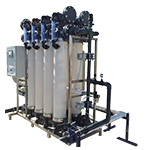Ultra Filtration

EXPLANATION
As it is known, one of the most commonly used methods for the removal of microbiological impurities in drinking water is chlorine dosing. The effect on the removal of these microorganisms is quite high, but not 100 percent. Organisms capable of withstanding disinfectants such as certain spore microorganisms can only be retained by ultrafiltration membranes. Thus, as the pore diameters of the membranes we use in ultrafiltration systems are smaller than the diameters of the microorganisms, we ensure the water purification with 100 percent confidence. In addition, organic substances and chlorine compounds in water form trihalomethanes (THMs) which cause irreversible diseases toxin effects in the human body. In this sense, the most important advantages of ultrafiltration are that it does not give any additives to the water, leaves no waste product and does not produce unwanted oxidative substances.
UF ultrafiltration modules provide excellent filtration of surface waters as well as conventional, biological and chemical treatment effluents to be fed into reverse osmosis systems. It also plays an important role in waste water recovery projects. Again they are used quite a lot in the pretreatment of sea water osmosis systems.
UF systems are also used successfully in seawater treatment, food and beverage processes, natural drinking water preparation plants, bacterial uptake, indirect disinfection of water and many special processes. Special designs for the recovery of wastewater and 'membrane bio reactor' (MBR) origin, water recovery processes are the core of the systems.
